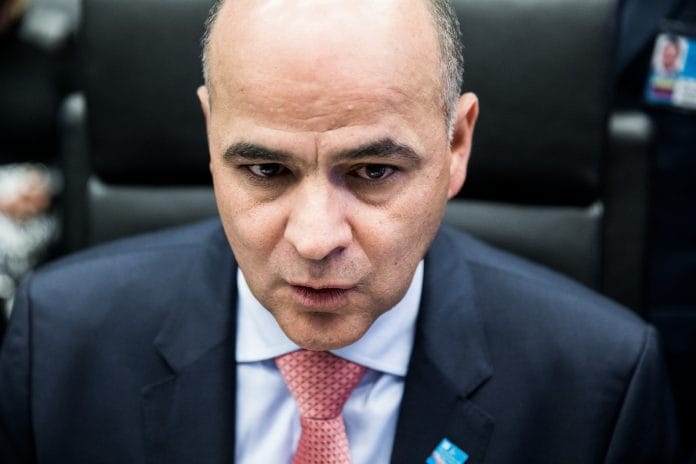New Delhi: Venezuela’s oil minister made a surprise appearance at an energy event in India, as the embattled OPEC producer seeks closer ties with major crude customers in the face of crippling US sanctions.
Manuel Quevedo said on Monday his nation wants to sell more crude to India, and that US measures have resulted in a $20 billion loss to the Latin American country’s economy. He’s also the head of state producer Petroleos de Venezuela SA — a post the career military man was appointed to in late 2017 as President Nicolas Maduro began to purge large swathes of the firm’s managerial ranks.
His arrival in India coincides with swirling speculation over the future of the Venezuelan oil industry, following a ban on its crude by the Donald Trump administration. PDVSA is seeking to retain buyers in other big consuming-countries such as China and India after American refiners halted purchases. The US wants to get Maduro to cede power to an interim government led by Juan Guaido — a lawmaker who claims he’s the country’s rightful leader.
India is set to emerge as Venezuela’s preferred customer due to the nation’s willingness to pay for crude in cash, as opposed to sales to China that are supplied via oil-for-loans agreements, according to Sushant Gupta, director of Asia-Pacific refining at Wood Mackenzie Ltd. The OPEC nation’s output could decline further if it fails to secure enough funds for upstream investments, after production halved from 2016 levels to about 1.3 million barrels a day in January.
Quevedo, who met Indian Oil Minister Dharmendra Pradhan on Monday, said his country’s production is now at 1.57 million barrels per day. Venezuela, which currently holds the OPEC presidency, has a “healthy relationship” with the Asian country, he said at the Petrotech conference near New Delhi, where he originally wasn’t on the list of attendees.
“I have met the Indian oil minister, we are going to meet again,” Quevedo said. “We have a good relationship with India and we want to continue this relationship.”
Reliance Industries Ltd., an Indian refiner that operates the world’s biggest processing complex, is taking a parcel of Venezuelan synthetic oil Hamaca that was originally scheduled for delivery to a LyondellBasell Industries NV plant in the US, according to person with knowledge of situation and shipping reports compiled by Bloomberg. The last time India got the grade was in April 2018.
Oil tankers
Venezuela will need to make a lot more such sales to sustain its oil industry. The US sanctions have sliced its oil exports to a 10-month low. Last year, the nation loaded one vessel a day for US refiners. After the American restrictions were imposed on 28 January, only one tanker has loaded over a 10-day period. That has turned oil ships into floating storage facilities.
There are more than 8 million barrels of Venezuelan crude idling all over the Gulf of Mexico in an area that stretches from US coast to the Yucatan Peninsula in Mexico, according to cargo-tracking and market intelligence company Kpler.
Guaido, the head of Venezuela’s National Assembly, is trying to wrest ownership of PDVSA’s Houston-based unit, Citgo Petroleum, away from the current regime. The move forms a key part of his strategy to topple Maduro and install an interim government that would call new elections. Guaido has said he plans to name a new board of directors for the state producer and its US subsidiary.
The US wants to “steal Citgo from Venezuela,” Quevedo said on Monday. “Citgo is a Venezuelan-owned petroleum company. The United States is simply trying to eliminate competitors.” –Bloomberg
Also read: Why in once-prosperous Venezuela, its citizens are now eating cats to survive






